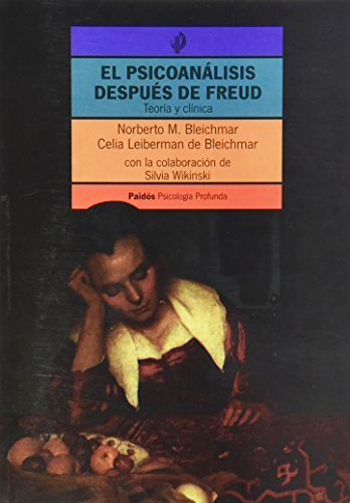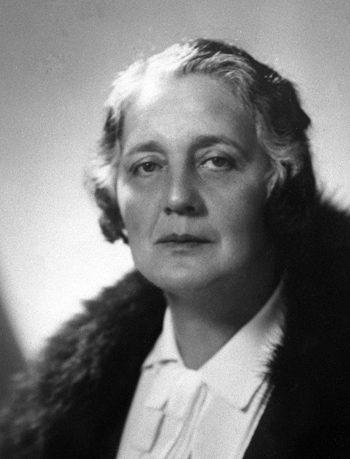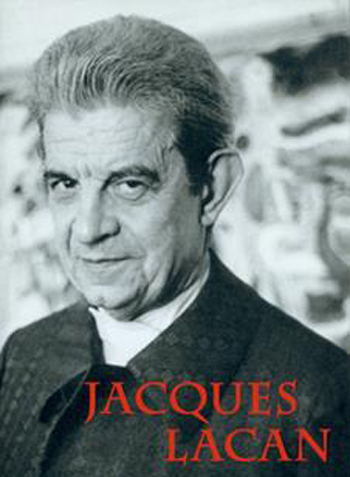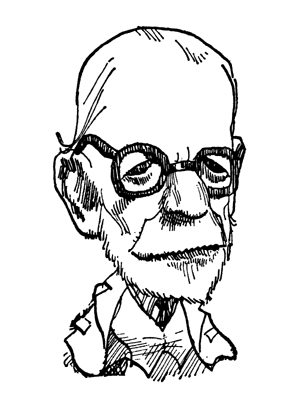Personalities
 |
 |
 |
 |
 |
 |
 |
Main Authors in the
Post-Freud Psychoanalysis

Psychoanalysis after Freud explores the many mutations made in the post-WWII
After Sigmund Freud's death in 1939, Psychoanalysis had a period of paralysis caused by World War II. The same happened with arts, sports and science in general. After that great conflict, work, study and science slowly returned to their normal path.
Then, authors in psychiatry with new theories – many of them conflicting – came to light. I hope to give an overview of some the them, stressing the system of Jacques Lacan.
I have already explained the ideas of Carl Gustav Jung, (here, here, here and here) who made his own movement after his split with Freud.
Melanie Klein & children
Another of the more important of these authors was Melanie Klein.
Melanie Reizes was born in Vienna in 1882 into a Jewish family with serious emotional problems, which led to the early deaths of several family members, including her dear sister Sidonie, who died of tuberculosis at age 8. At age 21 she married Arthur Klein, an industrial chemist, and had five children with him. After World War I she moved to Berlin and later to London. It was her own unhappy marriage that led Klein to depression, treatment and finally, the study of Psychoanalysis.

Klein made innovation in children's psychology,
observing & working with infants
She was innovative in working directly with children in her observation, often as young as age two, observing their play with toys and interpreting the unconscious meaning behind it. While Freud considered sexual pleasure as the prime motive drive of man, Klein thought human behavior was driven primarily by human contact and relationships.
In the '30s Freud became aware of Klein's works and disapproved the changes she wanted to introduce in Psychoanalysis. Melanie Klein was not expelled from the Psychoanalysis Society by Freud because the latter was already very old and did not want to create another schism in the movement, especially in the anti-semitic environment characterized by the ascension of Adolph Hitler and Nazism in Germany.
But I must say that she created a new school or, at least, a new tendency within the psychoanalytic culture. To this day we can find followers of her theories.
Winnicott: Healthy development relies on the mother's care
In addressing the psychoanalyst movement after Freud, one cannot forget the more contemporary author, Donald Woods Winnicott (1896-1971).
Winnicott was born in 1896 in England in the small city of Plimude and died in London in 1971. Today he is in fashion and many academic papers are published on his thinking. He is considered a "psychologist of the good" because he gives a great importance to the affection, care and closeness of the mother toward her baby in his first years of life. He believed the "true self" began to develop in infancy, and the "false self" is a defense mechanism to conform to other's expectations.
Like Jung, he speaks of the importance of a healthy religiosity in the life of men.
Lacan, another strange mutant
Another thinker in this field whom I would like to address at a little more length is the French psychoanalyst Jacques Lacan and his work.
Jacques-Marie Émile Lacan was born in Paris on April 13, 1901 and died in that same city on September 9, 1981.

His work led to post-structuralism, feminist theory & cultural theory
Actually, Lacan states that the individual is constituted by his language or, if one prefers, by his words. For him there is not an ontological substance or essence that constitutes human nature. Man is simply a network of words or language that is established as he enters into relationships with the "other."
Although he was not able to elaborate a clinical theory, he took a sort of qualitative leap and tried to make his Psychoanalysis a Philosophy of the real. So, for him, man is constituted by words… Descartes stated: "I think, therefore I am"; Lacan made his own weaker version of the statement: "I speak, therefore I am."
He studied in Catholics schools and in his youth he considered entering the religious life. But, like many other personages of the 20th century, he abandoned religion and tried to build an atheistic and materialist philosophical-psychoanalyst edifice.
He was expelled from the International Psychoanalytical Association in 1953 and established his own school, the French School of Psychoanalysis that he later changed to the School of the Freudian Cause.

Freud's fundamental doctrine & errors
led to a succession of others
He also was unable to speak satisfactorily of God (either His presence or His absence) in creation. After his death, some of his disciples tried to continue this "philosophy of the language" but met with failure. Lacan's disciples eventually acknowledged the enormous problem of discoursing about a matter they did not understand and no longer insisted on defending an obtuse Philosophy. Someone said that Lacan was just a product of fashion, valorized in the French ambience like clothes, perfumes and philosophies.
"Lacanism" became a kind a sect that had its own exoteric language, which only the initiated could understand. Like every sect its members ended by spliting into subdivisions and subgroups whose main concern was to attack their rivals.
This is the situation of Psychoanalysis in France today.
In coming installments I plan to address this topic with more details.
To be continued

Posted February 16, 2022
______________________
______________________





